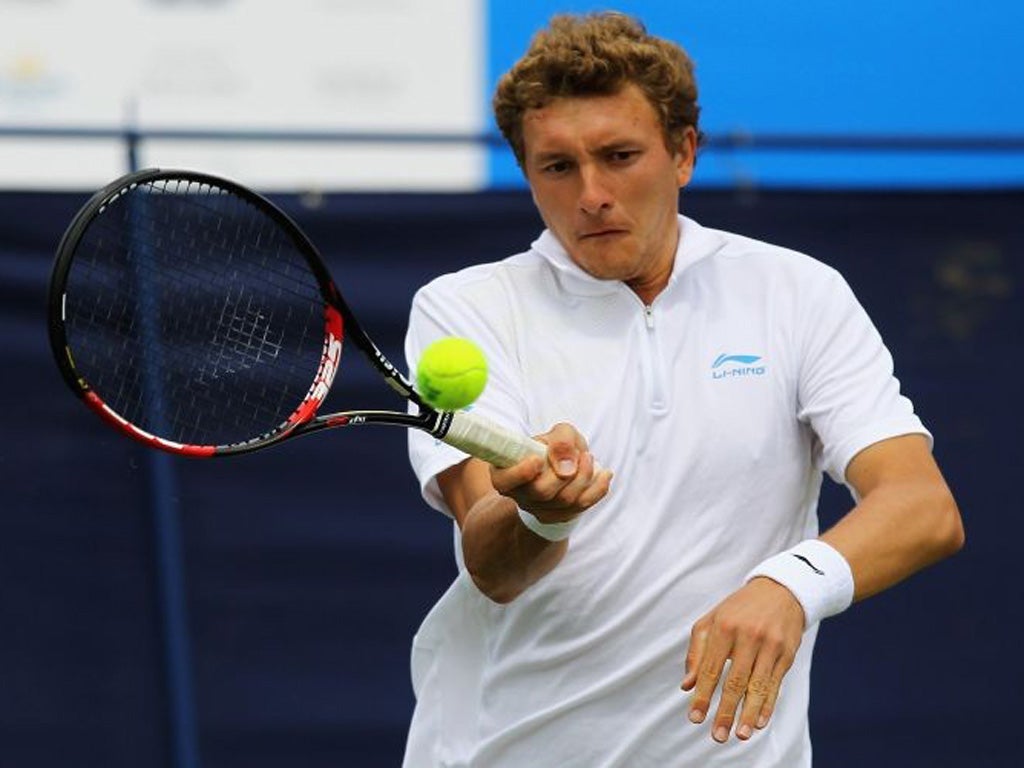Mother does know best for Istomin – as she's his coach
Unusual arrangement seems to work well for Uzbekistan's finest as he reaches round four

To the casual viewer the elegant lady sitting quietly in the corner of court 18, wearing Lacoste flip-flops, white slacks and a pink jumper, was a typical Wimbledon spectator, someone who would not look out of place shopping in Wimbledon village on Sunday's rest day. The keen-eyed may have noticed, though, that she only applauded, politely, when Denis Istomin won points, and every so often the Uzbekistani looked towards her.
The woman was Klaudiya Istomin, Denis' mother and, more unusually, his coach. She is obviously doing a good job - the strapping 25-year-old is No.39 in the world and yesterday reached the fourth round of a grand slam for the first time when he defeated Alejandro Falla in four sets, but the mere fact she is doing it at all is worthy of note. It is not uncommon to find a parent coaching a tennis player, but mostly – and sometimes notoriously - it is a father coaching a daughter. Moreover female coaches of male athletes, sons or not, are rare in any sport.
The Manageress, the fondly-remembered TV series starring Cherie Lunghi, was screened decades ago but its premise is as improbable now as then. Hope Powell, the manager of the GB women's Olympic football team, and England ladies, is regularly asked if she could coach in the men's game. She usually answers in the affirmative but has never received a serious offer.
There is, according to Nick Bollettieri, The Independent columnist and head coach of IMG Bollettieri academy, no reason why women should not coach. He said: “Around 12 of our 50 coaches are female, and they coach males and females. Technically the game is the same whether it is a man or woman playing.”
Istomin largely agreed with that, but pin-pointed a different aspect. “It is not on court, but off court, which is the problem. It is difficult for a man to travel with a female coach. With a guy you can go and have dinner, drink beer and so on, so it is easier for man to be with a male coach.” Istomin's case is different, he and his mother even share a room to save costs. “It is OK, we are family. It means I can't brings girls to my room - but that's OK as I have a girlfriend at home. I have my own house at home”
In America the percentage of coaches who are female has declined since Title IX, the landmark 1972 legislation which forced schools and colleges to invest equally in sport for both sexes. Most coaches of female teams are male while less than five per cent of male teams are coached by women. In the US around 85 per cent of youth coaches are men. Anecdotal evidence suggests the figure in Britain is at least as high. Thus when a Hall of Fame basketball star such as Michelle Lieberman becomes coach of the Texas Legends development team [effectively an NBA reserve/academy team], as she did in 2009, it is big news.
One clue as to why so few women coach at any level is in the reason Lieberman gave when giving up the post three years later to take up an administrative role. “I don't want to have any regrets as a mum. I have one son and he is has one senior year [left]. I want him to look up and see me in the stands. It is not to say I am not going to coach again but it felt like the right thing to do now.”
When Istomin looks up his mum is in the stands, but there are family issues. “I have a brother who is 14 years younger than me,” he said. “When he was very young my mother stayed at home for a couple of years and I had another coach.” The brother is only 11 now but, said Istomin, “it is OK, his relationship with my father is good.”
Istomin had a racket in his hand at an early age. “I grew up on the court,” he said. “She worked with young players at the club.” Naturally enough, when Denis showed promise she began to coach him. Then at 14 he suffered leg injuries in a car crash that required three months in hospital and 80 stitches. He did not pick up a racket for two years and would have given up the game but for his mother's intervention. “She believed in me, she persuaded me to play again.”
As well as saving on the salary and expenses of a coach having his mother n his corner has other benefits for Istomin. “This is someone I can trust completely. We understand each other, we try and improve my game together.”
This is the first time he has reached the fourth round of a grand slam. Ad he defeated his Colombian opponent yesterday the elegant lady in the corner clapped. As his coach she will have been pleased. As his mum she will have been thrilled.
Fair play: Men coached by women
Oliver Marach The Austrian, who has become a doubles specialist, has been coached by his wife, Jessie, since 2009. His website claims that "she brings calmness to his game and makes him feel good when she's around".
Mikhail Kukushkin The Kazakh is coached by his wife, Anastasia Ulikhina, and is currently ranked at number 52 in the world.
Donald Young The 22-year-old American from Atlanta is coached by his mother, Illona, and is currently ranked 51st in the world.
Jimmy Connors The American former world No 1, who won eight Grand Slam singles titles, including Wimbledon in 1974 and 1982, was coached by his mother Gloria throughout much of his career.
Will Aitkenhead
Join our commenting forum
Join thought-provoking conversations, follow other Independent readers and see their replies
Comments
Bookmark popover
Removed from bookmarks